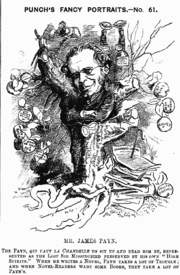
James Payn
Encyclopedia

England
England is a country that is part of the United Kingdom. It shares land borders with Scotland to the north and Wales to the west; the Irish Sea is to the north west, the Celtic Sea to the south west, with the North Sea to the east and the English Channel to the south separating it from continental...
novelist.
Family
Payn's father, William Payn (1774/5–1840), was clerk to the Thames CommissionersThames Navigation Commission
The Thames Navigation Commission used to manage the River Thames in southern England. In particular, they were responsible for installing or renovating many of the locks on the river in the 18th and early 19th centuries.- History :...
and at one time treasurer to the county of Berkshire
Berkshire
Berkshire is a historic county in the South of England. It is also often referred to as the Royal County of Berkshire because of the presence of the royal residence of Windsor Castle in the county; this usage, which dates to the 19th century at least, was recognised by the Queen in 1957, and...
. Payn was educated at Eton
Eton College
Eton College, often referred to simply as Eton, is a British independent school for boys aged 13 to 18. It was founded in 1440 by King Henry VI as "The King's College of Our Lady of Eton besides Wyndsor"....
, and afterwards entered the Military Academy at Woolwich; but his health was not equal to the demands of a military career, and he proceeded in 1847 to Trinity College, Cambridge
Trinity College, Cambridge
Trinity College is a constituent college of the University of Cambridge. Trinity has more members than any other college in Cambridge or Oxford, with around 700 undergraduates, 430 graduates, and over 170 Fellows...
. He was among the most popular men of his time, and served as president of the Union
Cambridge Union Society
The Cambridge Union Society, commonly referred to as simply "the Cambridge Union" or "the Union," is a debating society in Cambridge, England and is the largest society at the University of Cambridge. Since its founding in 1815, the Union has developed a worldwide reputation as a noted symbol of...
. Before going to Cambridge he had published some verses in Leigh Hunt's Journal, and while still an undergraduate put forth a volume of Stories from Boccaccio in 1852, and in 1853 a volume of Poems.
In the same year he left Cambridge, he met and shortly afterwards married Miss Louisa Adelaide Edlin (b. 1830 or 1831), sister of Judge Sir Peter Edlin, later chairman of the London Quarter Sessions. They had nine children, the third of whom, Alicia Isabel (died 1898), married The Times editor George Earle Buckle
George Earle Buckle
George Earle Buckle was an English editor and biographer.-Early years:Buckle was the son of George Buckle, a rector, and canon and precentor of Wells Cathedral, and Mary Hamlyn Earle, the sister of the philologist John Earle. He attended Honition grammar school and Winchester College before...
.
Editor and novelist
Payn then settled down in the Lake districtLake District National Park
The Lake District National Park is located in the north-west of England and is the largest of the English National Parks and the second largest in the United Kingdom. It is in the central and most-visited part of the Lake District....
to a literary career and contributed regularly to Household Words
Household Words
Household Words was an English weekly magazine edited by Charles Dickens in the 1850s which took its name from the line from Shakespeare "Familiar in his mouth as household words" — Henry V.-History:...
and Chambers's Journal. In 1858 he removed to Edinburgh
Edinburgh
Edinburgh is the capital city of Scotland, the second largest city in Scotland, and the eighth most populous in the United Kingdom. The City of Edinburgh Council governs one of Scotland's 32 local government council areas. The council area includes urban Edinburgh and a rural area...
to act as joint-editor of the latter periodical. He became sole editor in 1860, and conducted the magazine with much success for fifteen years. He removed to London in 1861. In the pages of the Journal he published in 1864 his most popular story, Lost Sir Massingberd. From this time he was engaged in writing novels, including Richard Arbour or the Family Scapegrace (1861), Married Beneath Him (1865), Carlyon's Year (1868), A County Family (1869), By Proxy (1878), A Confidential Agent (1880), A Grape from a Thorn, The Talk of the Town (1885), and The Heir of the Ages (1886).
In 1883 he succeeded Leslie Stephen as editor of the Cornhill Magazine
Cornhill Magazine
The Cornhill Magazine was a Victorian magazine and literary journal named after Cornhill Street in London.Cornhill was founded by George Murray Smith in 1860 and was published until 1975. It was a literary journal with a selection of articles on diverse subjects and serialisations of new novels...
and continued in the post until the breakdown of his health in 1896. He was also literary adviser to Messrs Smith, Elder & Company. His publications included a Handbook to the English Lakes (1859), and various volumes of occasional essays, Maxims by a Man of the World (1869), Some Private Views (1881), Some Literary Recollections (1884). A posthumous work, The Backwater of Life (1899), revealed much of his own personality in a mood of kindly, sensible reflection upon familiar topics. He died in London, on 25 March 1898.
A biographical introduction to The Backwater of Life was furnished by Sir Leslie Stephen.

